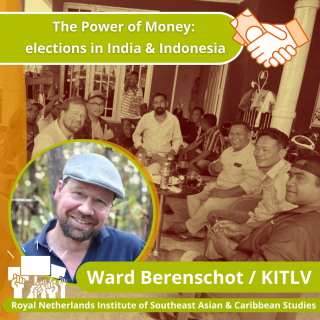Meet the Expert | Ward Berenschot
Prof. Ward Berenschot is a political anthropologist, working as a senior researcher at KITLV and at the University of Amsterdam. He focusses on politics in India and Indonesia, particularly on informality and the role of money in election campaigns. LeidenGlobal spoke with him on his research and how he sees the future of election campaigns in these countries.
During his studies in Political Science, he went to India to study Hindu-Muslim violence, on which he wrote his PhD dissertation. In his research, he uses anthropological methods, such as fieldwork, which he sees as a very useful and important way to get to know how power really works. He has studied a range of topics in India and Indonesia, such as palm oil conflicts, access to justice and legal aid, election campaigns and campaign finance.
2024 was a big year for both countries in terms of elections, as national and regional elections took place in India and Indonesia. During these times, prof. Berenschot went to these countries to study how politicians spend money and where they get it from. Especially in Indonesia, handing out money during election campaigns is a common practice, to the point where “voters now expect to receive money from politicians during election times,” he mentioned. This leaves politicians no choice but to engage with businessmen. These businessmen will give out large sums of money when promised that they get certain licenses once the politician gets elected. The same goes vice versa: “you have to cultivate relations with politicians, if you want to be successful in business.” Berenschot highlighted an event on his recent field work trip in Indonesia, where a mining businessman was sitting in a room with two politicians, as a big plastic screen box filled with cash money was brought in. What was notable, he mentioned, was “how openly they talked to me on how to execute vote buying.”
Prof. Berenschot emphasises the importance of on the ground work to see what’s truly going on and how strategies for vote buying are implemented. This is something that’s much harder to research with a survey, though he uses a combination of qualitative and quantitative research.
In Indonesia, he’s afraid there’s a real chance that national politicians will abolish some local elections within the next few months, using the practice of vote buying as an excuse to abolish these elections altogether. When he speaks at seminars, he tries to advocate for reforms instead of abolishment: “use the current situation to enact reforms, improve procedures in the electoral system and criminalize vote buying instead of being so tolerant about the practice.” In India, authorities are being more proactive in tracing and arresting people that might be involved in vote buying. However, in both countries, Berenschot sees an oligarchisation of democracy, meaning that “those that are very rich can use that money to get political power, those who have political power can use that power to get rich.” He hopes his research project can help in motivating these countries to enact reforms to reduce the cost of election campaigns.
Earlier this year Ward Berenschot was a guest at BNR Nieuwsradio (in Dutch) to discuss the Indian elections, in which Prime Minister Modi won again. He also featured in an Indonesian podcast (in Dutch) on the power struggle in Indonesia over an election law and the public's growing frustration with political maneuvering.
Interview by LeidenGlobal Intern Eline Raukema
January 2025
Have a look at our other experts on the Expert page

